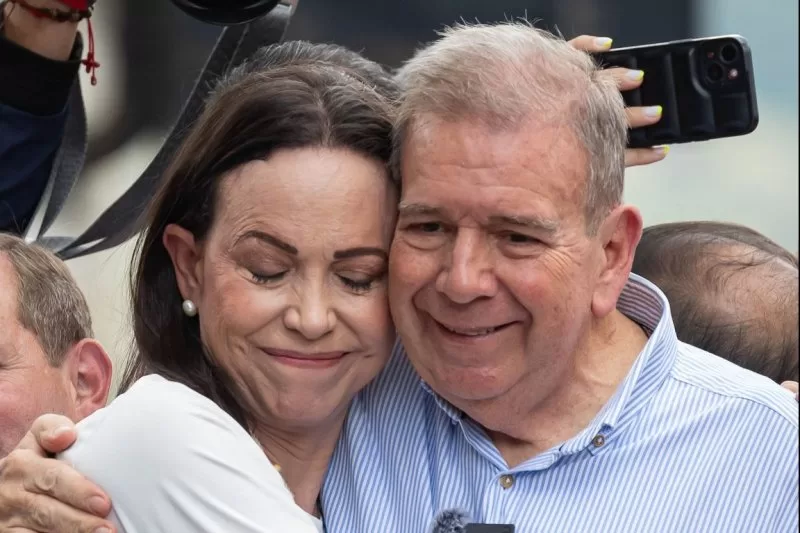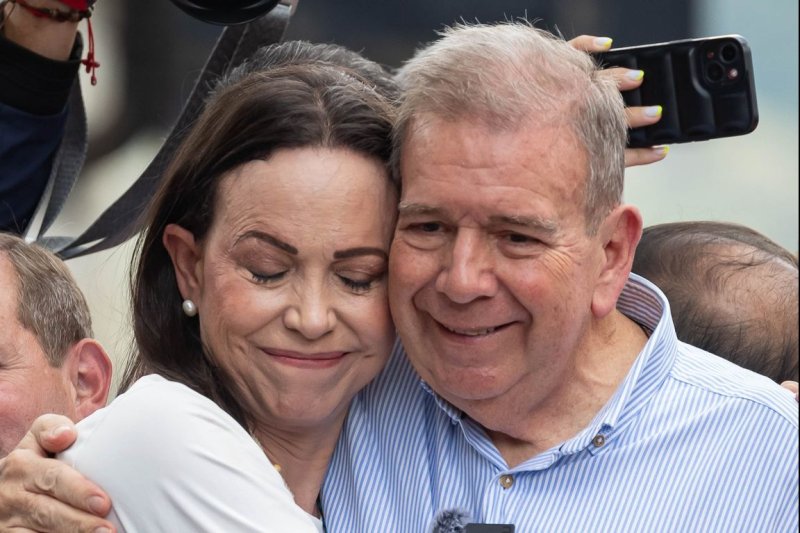Venezuelan opposition leader Maria Corina Machado (L) hugs Venezuelan presidential candidate Edmundo Gonzalez Urrutia at a rally in Caracas, Venezuela, on Tuesday. On Monday, the attorney general announced they were under investigation over asking the military and police to join them and end their repression of civil society. Photo by Ronald Pena R/EPA-EFE
Aug. 5 (UPI) — Venezuela’s attorney general announced Monday that he’s investigating opposition presidential candidate Edmundo González and opposition leader Maria Corina Machado after they called on the military and police to end their support for the country’s authoritarian leader and repression of public dissent.
The country’s attorney general, Tarek William Saab, announced the investigation against the opposition leaders in a statement, citing their dissemination of a communique hours earlier.
Saab said that in the communique the opposition leaders “falsely announce a winner of the presidential elections different from the one proclaimed by the National Electoral Council” and openly incite “police and military officials to disobey the laws.”
Usurpation of functions, dissemination of false information to cause distress, instigation to disobedience of laws, instigation to insurrection and conspiracy are among the crimes Saab accuses González and Machado of committing.
The one-page letter González and Machado published to their social media accounts a few hours earlier states they seek to appeal to “the conscience of military and police officers to stand by the people and their own families.”
“Faced with this massive violation of human rights, aligning with Maduro and his interests means betraying yourselves,” they said.
“Venezuelans are not enemies of the [National Bolivarian Armed Forces of Venezuela]. With this disposition, we call for actions of organized groups by the Maduro clique, a combination of military and police squadrons and armed groups outside the State, who beat, torture, and also murder, under the protection of the malignant power they represent, to stop and immediately cease these actions.”
González and Machado have been leading a civic movement against Maduro following last month’s presidential election that they say González won.
The election was held July 28, and the country’s election commission announced that Maduro had been elected to a third term in office. However, it has not provided proof of Maduro’s victory, which has also been widely disputed by Western nations, including the United States, and nonprofit organizations, such as The Carter Center.
The opposition leaders state González won the presidency with 67% of the vote while citing detailed voting tallies they have obtained.
The movement has been met by Maduro’s security forces, and the pair earlier Monday called on the police and military to “not repress the people, accompany them.”
The Caracas-based human rights organization Foro Penal said Monday at least 1,010 people have been arrested and 11 killed due to political repression since the election. The Venezuela-based human rights organization Provea said Monday that 20 people have been killed.
The United States last week formally recognized González as the winner of the election. Other Democratic nations, such as Canada and the European Union, have not gone quite so far, but have rejected Maduro’s claim of victory.
The countries are also mounting pressure on Maduro to release the electoral data that shows.
“We call on Venezuelan authorities to release promptly all the tally sheets in order to guarantee the full transparency and integrity of the electoral process,” a joint statement Saturday from France, Germany, Spain, the Netherlands, Poland and Portugal said.
“The opposition indicates that they have collected and published over 80% of the tally sheets that were produced at each voting table. This verification is essential for recognizing the will of the Venezuelan people.”
Maduro has led the country since Hugo Chavez died in 2013, which occurred right before the country was hit with an economic crisis that has led to more than 7 million people to flee the country.
His re-election in 2018 was also met with domestic and international condemnation for being illegitimate, with the United States under the previous Trump administration leading a failed attempt to oust him from the country’s helm.

